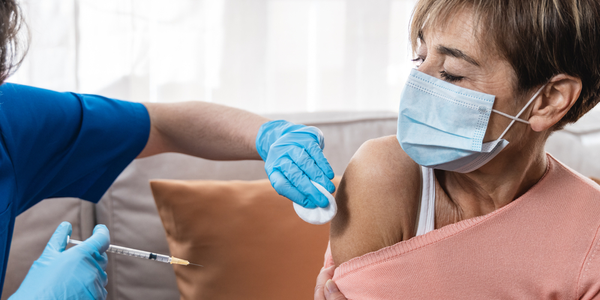Covid-19 Update USA: What You Need to Know in 2023

Pandemic. Antibodies. Vaccines. PPE. COVID-19 update. Front-line workers. Social distancing. All this jargon is enough to make even the most medically-minded person’s head spin. And yet, these are only a few of the words that were added to our everyday vocabulary in 2020. It’s vital to stay updated on COVID 19 update USA for the latest info specific to the United States.
COVID-19 Update USA Edition
But what does all this news really mean to you? How do you stay current and safe?
This month we’re sharing a COVID-19 update, information on the available vaccines and how the pandemic will continue to impact you in 2021.
Herd immunity is not a solution
Herd immunity is probably another term you’ve become familiar with this year. But what does herd immunity really mean?
Throughout 2020, a few public figures touted the merits of developing natural herd immunity to conquer the virus. Their idea was that once everyone has had COVID, the population will develop natural resistance to getting the virus again. But that’s not what herd immunity is.
We reach herd immunity when the majority of a population is inoculated against a disease. Herd immunity is not when a majority of the population has been exposed to and (hopefully) recovered from the illness.
For example, in the United States, we have herd immunity for measles. The herd immunity is because roughly 91% of the U.S. population has been vaccinated for measles—not because most of the population has been exposed to measles. Herd immunity protects those who can’t receive vaccines either because of allergy or pre-existing condition.
Safely cultivating herd immunity is the result of a robust, effective vaccine program. Herd immunity to COVID-19 cannot be safely achieved naturally. Attempting this would be dangerous, especially for those with the greatest risk of joining the more than 443,000 Americans who have already lost their lives to this deadly disease.
The vaccine is the future
The only path to herd immunity is vaccinating as many people as possible. This is what will protect us from future outbreaks of the virus and prevent people from becoming seriously ill when exposed.
Some people question whether or not the vaccine is safe. The short answer: it is! All COVID-19 vaccines have gone through rigorous clinical trials involving tens of thousands of test subjects and government analysis. The development of this vaccine is comparable to the flu vaccine and is based on similar scientific principles. In the last 10 years, 1.8 billion flu vaccines have been administered with few, if any, documented adverse effects.
The CDC has been closely monitoring the vaccine effort and recently reported that six weeks and 23.5 million shots into the vaccination campaign, “there have been very few serious side effects.” That’s why every American—especially seniors at a higher risk for severe illness and death—should get the shot as soon as they’re eligible.
So how does this safe vaccine work, anyway? There are a few different COVID-19 vaccines, but none of them expose you to the live virus! Much like the flu vaccine, COVID-19 vaccines add a protein to the immune system to prevent the virus from overwhelming the body. Some of the vaccines do this by triggering your body to create its own proteins. In contrast, others work by directly inputting the protein into the body to trigger an immune response to the virus if infected. Again, none of the COVID-19 vaccines expose you to the live virus.
Precautions are still important
News of the vaccine and its success are encouraging, but now isn’t the time to let down your guard. Continue wearing a mask, washing your hands frequently and keeping a safe distance from others—even after you’ve received the vaccine.
After vaccination, there’s still a slim chance of getting infected with the virus. And scientists still aren’t sure if vaccinated individuals can asymptomatically carry the virus to others. So continue to follow basic COVID-19 precautions even after you’re vaccinated.
All things considered, COVID-19 is still a new virus. The medical community is working hard to learn more every day. Prevention and treatment are improving, but fully understanding how COVID-19 works is a science that’s constantly building on itself.
As the science on COVID-19 evolves, recommendations are a moving target. Stay informed and alert to ensure you’re always following best practices. If you still have questions about COVID-19, contact your medical professional or consult the Centers for Disease Control website.
image credit: shutterstock/Vane Nunes
- How Medicare Advantage Plans Cover Seniors’ Vision, Hearing, and Dental Needs - October 29, 2024
- 2025 Medicare Part D Changes: How to Save on Prescriptions - October 25, 2024
- Everything You Need to Know About the 2025 Medicare Changes and How They Affect You - October 21, 2024

